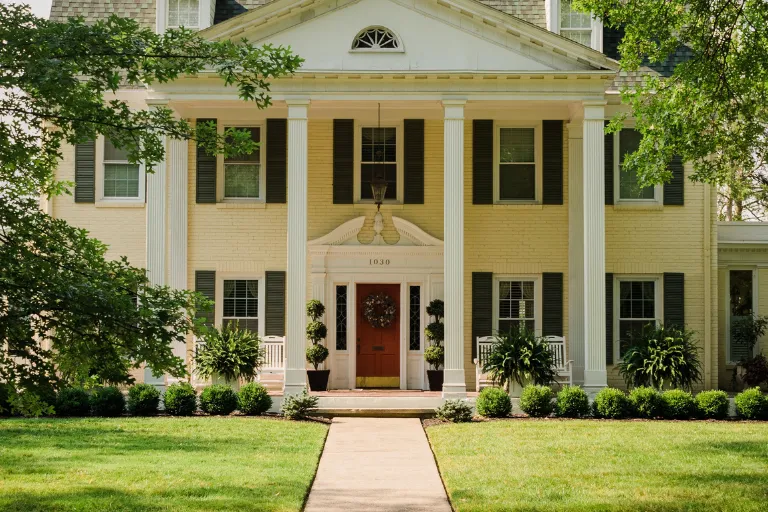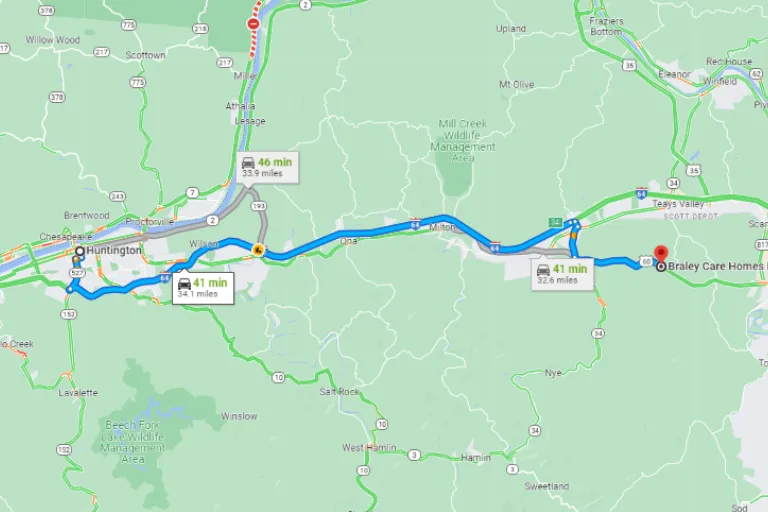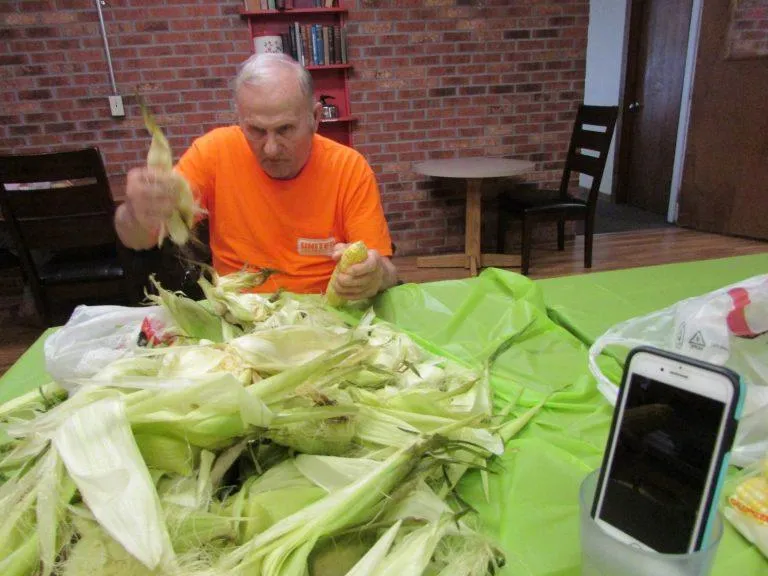Visit us: Mon - Fri: 9:00 - 18:30
Braley Care Homes 6192 US 60 Hurricane, WV 25526
Memory Care in Huntington
West Virginia
Looking for Memory Care in Huntington WV ?
You are in the right place. Let's go ahead and and talk about what memory care is and
where to find a memory care facility nearby.
Looking for Memory Care in Huntington WV ?
You are in the right place. Let's go ahead and and talk about what memory care is and where to find a memory care facility nearby.
What is Memory Care ?
Nearly 50% of older adults living in long-term care centers suffer from Alzheimer’s and other forms of dementia. For the families living with a loved one with dementia, they usually have to choose between a nursing home or memory care. What sets the two apart is that nursing homes are meant for people with just about any medical ailment that makes it difficult to stay at home unattended.
Memory care, on the other hand, is strictly dedicated to taking care of people with dementia. Memory care facilities are structured to serve the needs of residents with dementia and usually work within care units of care centers. Some memory care facilities are highly secure while others are less strict when it comes to access.
If you have an elderly loved one experiencing difficulties with their memory which are preventing them from performing daily living activities such as bathing, eating, dressing, walking, and self-administering medicine, then you should probably consider transferring them to a memory care unit. Below is important information that could help you make a more informed decision concerning memory care facilities, what services they offer, and how further they differ from nursing homes.
Specialized Support for People With Alzheimer’s or Dementia
What is Memory Care ?
Nearly 50% of older adults living in long-term care centers suffer from Alzheimer’s and other forms of dementia. For the families living with a loved one with dementia, they usually have to choose between a nursing home or memory care. What sets the two apart is that nursing homes are meant for people with just about any medical ailment that makes it difficult to stay at home unattended.
Memory care, on the other hand, is strictly dedicated to taking care of people with dementia. Memory care facilities are structured to serve the needs of residents with dementia and usually work within care units of care centers. Some memory care facilities are highly secure while others are less strict when it comes to access.
If you have an elderly loved one experiencing difficulties with their memory which are preventing them from performing daily living activities such as bathing, eating, dressing, walking, and self-administering medicine, then you should probably consider transferring them to a memory care unit. Below is important information that could help you make a more informed decision concerning memory care facilities, what services they offer, and how further they differ from nursing homes.
Specialized Support for People With Alzheimer’s or Dementia
The right facility can improve safety and
quality of life for a loved one.
When it becomes difficult to care for someone with Alzheimer’s disease or dementia at home, you may want to consider memory care. Memory care in Huntington West Virginia is a form of senior living that provides intensive, specialized care for people with memory issues.

7 Things You Need to Know About Memory Care in Huntington West Virginia Facilities
The right facility can improve safety and quality of life for a loved one.
When it becomes difficult to care for someone with Alzheimer’s disease or dementia at home, you may want to consider memory care. Memory care in Huntington West Virginia is a form of senior living that provides intensive, specialized care for people with memory issues.

7 Things You Need to Know About Memory Care in Huntington West Virginia Facilities
Where is Huntington West Virginia ?
Sitting on the Ohio River at the point where West Virginia, Ohio and Kentucky meet, Huntington is home to educational and cultural opportunities as well as one of the largest river ports in the United States.

Where is Braley Care Homes Memory Care Facility Located?
It's very near Huntington, WV. We are at 6192 US 60 Hurricane, WV 25526
So it's literally just a few minutes away!

Where is Huntington West Virginia ?
Sitting on the Ohio River at the point where West Virginia, Ohio and Kentucky meet, Huntington is home to educational and cultural opportunities as well as one of the largest river ports in the United States.

Where is Braley Care Homes Memory Care Facility Located?
It's very near Huntington, WV. We are at 6192 US 60 Hurricane, WV 25526 So it's literally just a few minutes away!

The demand for memory care in Huntington, WV is expected to rise sharply over the coming decades. As many as 5 million Americans are living with Alzheimer’s disease, and by 2060 this number is projected to nearly triple to 14 million, according to the Centers for Disease Control and Prevention. As baby boomers grow older, they’re expected to create a surge of people needing dementia treatment. But what does memory care really entail? What makes this care unique, and does it actually help? These 7 facts can shed some much-needed light on memory care in Huntington, WV facilities.
Chris and Dean Braley opened Braley Care Homes on March 29, 2005. Braley Care Homes expanded into Alzheimer’s and Dementia care in 2008. Chris Braley is the owner and administrator of Braley Care Homes and it remains the only free-standing Alzheimer’s Dementia care Facility in West Virginia. Our facility was built with dementia care in mind and is the ideal environment for someone with this disease. It is locked 24 hours per day and has a beautiful outdoor courtyard with a pastoral view, which is secure at all times.
Our activities and behavior programming is geared toward meeting each individual’s needs, which helps keep their anxiety level down and reduces the risk of behavior. Chris Braley has a bachelor’s and Master’s degree in social work and is an LICSW (licensed independent clinical social worker). Chris shares, “dementia is not only in my professional life, but also in my personal life. My grandmother and father suffered from dementia, so I know the pain the families go through as they watch helplessly as their love one suffers. Our goal at Braley Care Homes is to tap into each resident’s unique qualities and help bring a calmness to both their life and their family’s life.
1. Memory care is more comprehensive but also more expensive than assisted living
The median cost of memory care was about $5,000 to $5,250 a month in 2019, according to eldercare cost figures from Genworth. That’s $1,000 to $1,250 more a month than assisted living. But in memory care
, the setting, staff, therapies, and monitoring are tailored to meet the specific needs of people with Alzheimer’s and other forms of dementia. This personalization helps increase safety by promoting familiarity and reducing confusion.

Memory care staff training and questions to ask.
Memory care in Huntington, West Virginia staff have specific backgrounds to treat and assist people with dementia and memory loss. A resident’s needs and cognitive abilities change as their disease progresses, so staff members receive ongoing training to meet those needs.
Memory care regulations regarding staff training vary by state. However, it’s not uncommon for all employees who come in contact with residents — including housekeepers and dishwashers — to have special training, says Niki Gewirtz, a Senior Living Advisor for A Place for Mom and a former executive director at a memory care community. “Training empowers the staff,” says Gewirtz. “They want to be able to interact with residents appropriately to help them.”
When touring memory care communities , Gewirtz suggests asking these four questions:
What does staff’s training entail?
How often is training given?
What does the state require?
Who receives the training?
Memory care services
As with assisted living, dementia care offers meal services, help with activities of daily living, and housing. Additionally, many standardized dementia care services include:
Additionally, many standardized dementia care services include:
A lower staff-to-resident ratio
24-hour supervised care
Specially trained nursing staff
Structured layouts and activities
Emergency call systems
Cognitive treatments and therapies

2. Memory care units have unique design elements
Memory care in Huntington, West Virginia units have enhanced security to prevent wandering, a common behavior among people with dementia. They tend to be smaller than assisted living communities and feature unique designs to assist with navigation, such as color-coded hallways.
“Many communities have flowing floor plans, so residents don’t feel like they’re pacing back and forth,” says Gewirtz. “These designs can help residents be redirected easier. They’re also more intimate and not as overwhelming.” To help residents enjoy the outdoors safely, some memory care communities have interior courtyards.
Memory care design features
• Additional layout or safety features can include:
• Clearly defined shared spaces
• Outdoor gardens or interior courtyards
• Memory boxes outside residents’ doors with personalized memorabilia to guide them and make them feel at home
• Secured or alarmed doors
• Keypad entrances for family or staff
3. Memory care includes innovative cognitive therapies
Memory care in Huntington West Virginia
addresses memory loss, wandering, and other side effects of dementia by providing effective therapies to reduce symptoms. Dementia treatments are based on the individual needs.
However, there are several common treatments used in dementia care:
• Art therapy
• Pet therapy
• Light therapy
• Music therapy
• Aromatherapy
• Sensory stimulation
• Storytelling
• Reminiscence therapy
Learn how some of these unique and innovative memory care treatments make a huge a difference in helping people with memory loss.


4. Memory care focuses on communication and dementia behaviors
Through advanced planning and communication, memory care staff are equipped to meet the needs of residents who exhibit a variety of dementia behaviors. Memory care specialists can offer specific help to manage symptoms of sundown syndrome like agitation, wandering, and confusion.
“For those who experience sundowning, it’s important to avoid overstimulation,” says Gewirtz. “Many communities may have exercise classes after breakfast, when residents can handle more stimulation. By around 2 p.m. or 3 p.m., they may engage in quieter activities such as aroma therapy to help them feel calmer leading into the evening.”
Additional layout or safety features can include:
• Clearly defined shared spaces
• Outdoor gardens or interior courtyards
• Memory boxes outside residents’ doors with personalized memorabilia to guide them and make them feel at home
• Secured or alarmed doors
• Keypad entrances for family or staff
5. Memory care facilities help families, too
"It’s a very emotional decision for anyone to place a loved one in memory care,” says Gewirtz. “ There’s often a stigma about it, but there shouldn’t be. You’re letting experts care for your family, and it’s important to prioritize your mental and physical health, too.”
Knowing your loved one is receiving trained, 24-hour care can provide peace of mind while relieving the pressures and stresses of caregiving. Many memory care facilities also provide family support through education and group activities.

Speakers and support groups
“Many communities either have support groups or refer families to local groups,” says Gewirtz. “A lot of communities like to give families the chance to meet with staff and managers and voice their input or suggestions each month.”
It’s also common for memory care units to feature a variety of speakers who talk about different subjects related to dementia. These events are usually open to families and the public at no cost, and they help reassure families they’re not alone.

6. Memory care doesn’t isolate seniors
Activities provide seniors with group or one-on-one interaction, depending on their physical health and cognitive ability. Entertainers and musicians perform at communities, and some activities directors plan activities based on residents’ hobbies, likes, or general needs.
Some common group activities include:
• Games like trivia or bingo
• Field trips to parks or shopping areas
• Tactile activities (such as painting or feeling different textures)
• Sensory stimulation (such as rubbing hands in lotion)Sing-alongs
• Memory care communities plan options for all residents, regardless of their dementia stage.
Many of these activities stimulate seniors’ minds, increase their motor skills, and provide social interaction.
7. Research is critical to finding the right memory care community
Our Senior Living Advisors can help connect you with
Memory care in Huntington, West Virginia communities in your area. When researching, consider your loved one’s needs as well as the services, programs, staff training, and design features of each community. Our memory care checklist can help you ask the right questions.

Speakers and support groups
“Many communities either have support groups or refer families to local groups,” says Gewirtz. “A lot of communities like to give families the chance to meet with staff and managers and voice their input or suggestions each month.”
It’s also common for memory care units to feature a variety of speakers who talk about different subjects related to dementia. These events are usually open to families and the public at no cost, and they help reassure families they’re not alone.
The demand for memory care in Huntington, WV is expected to rise sharply over the coming decades. As many as 5 million Americans are living with Alzheimer’s disease, and by 2060 this number is projected to nearly triple to 14 million, according to the Centers for Disease Control and Prevention. As baby boomers grow older, they’re expected to create a surge of people needing dementia treatment. But what does memory care really entail? What makes this care unique, and does it actually help? These 7 facts can shed some much-needed light on
memory care in Huntington, WV facilities.
Chris and Dean Braley opened Braley Care Homes on March 29, 2005. Braley Care Homes expanded into Alzheimer’s and Dementia care in 2008. Chris Braley is the owner and administrator of Braley Care Homes and it remains the only free-standing Alzheimer’s Dementia care Facility in West Virginia. Our facility was built with dementia care in mind and is the ideal environment for someone with this disease. It is locked 24 hours per day and has a beautiful outdoor courtyard with a pastoral view, which is secure at all times.
Our activities and behavior programming is geared toward meeting each individual’s needs, which helps keep their anxiety level down and reduces the risk of behavior. Chris Braley has a bachelor’s and Master’s degree in social work and is an LICSW (licensed independent clinical social worker). Chris shares, “dementia is not only in my professional life, but also in my personal life. My grandmother and father suffered from dementia, so I know the pain the families go through as they watch helplessly as their love one suffers. Our goal at Braley Care Homes is to tap into each resident’s unique qualities and help bring a calmness to both their life and their family’s life.
1. Memory care is more comprehensive but also more expensive than assisted living
The median cost of memory care was about $5,000 to $5,250 a month in 2019, according to eldercare cost figures from Genworth. That’s $1,000 to $1,250 more a month than assisted living. But in memory care
, the setting, staff, therapies, and monitoring are tailored to meet the specific needs of people with Alzheimer’s and other forms of dementia. This personalization helps increase safety by promoting familiarity and reducing confusion.

Memory care staff training and questions to ask.
Memory care in Huntington West Virginia staff have specific backgrounds to treat and assist people with dementia and memory loss. A resident’s needs and cognitive abilities change as their disease progresses, so staff members receive ongoing training to meet those needs.
Memory care regulations regarding staff training vary by state. However, it’s not uncommon for all employees who come in contact with residents — including housekeepers and dishwashers — to have special training, says Niki Gewirtz, a Senior Living Advisor for A Place for Mom and a former executive director at a memory care community. “Training empowers the staff,” says Gewirtz. “They want to be able to interact with residents appropriately to help them.”
When touring memory care communities , Gewirtz suggests asking these four questions:
What does staff’s training entail?
How often is training given?
What does the state require?
Who receives the training?
Memory care services
As with assisted living, dementia care offers meal services, help with activities of daily living, and housing. Additionally, many standardized dementia care services include:
Additionally, many standardized dementia care services include:
• A lower staff-to-resident ratio
• 24-hour supervised care
• Specially trained nursing staff
• Structured layouts and activities
• Emergency call systems
• Cognitive treatments and therapies
2. Memory care units have unique design elements
Memory care in Huntington, West Virginia units have enhanced security to prevent wandering, a common behavior among people with dementia. They tend to be smaller than assisted living communities and feature unique designs to assist with navigation, such as color-coded hallways.
“Many communities have flowing floor plans, so residents don’t feel like they’re pacing back and forth,” says Gewirtz. “These designs can help residents be redirected easier. They’re also more intimate and not as overwhelming.” To help residents enjoy the outdoors safely, some memory care communities have interior courtyards.

Memory care design features
• Additional layout or safety features can include:
• Clearly defined shared spaces
• Outdoor gardens or interior courtyards
• Memory boxes outside residents’ doors with personalized memorabilia to guide them and make them feel at home
• Secured or alarmed doors
• Keypad entrances for family or staff
3. Memory care includes innovative cognitive therapies
Memory care in Huntington West Virginia
addresses memory loss, wandering, and other side effects of dementia by providing effective therapies to reduce symptoms. Dementia treatments are based on the individual needs.

However, there are several common treatments used in dementia care:
• Art therapy
• Pet therapy
• Light therapy
• Music therapy
• Aromatherapy
• Sensory stimulation
• Storytelling
• Reminiscence therapy
Learn how some of these unique and innovative memory care treatments make a huge a difference in helping people with memory loss.
4. Memory care focuses on communication and dementia behaviors
Through advanced planning and communication, memory care staff are equipped to meet the needs of residents who exhibit a variety of dementia behaviors. Memory care specialists can offer specific help to manage symptoms of sundown syndrome like agitation, wandering, and confusion.
“For those who experience sundowning, it’s important to avoid overstimulation,” says Gewirtz. “Many communities may have exercise classes after breakfast, when residents can handle more stimulation. By around 2 p.m. or 3 p.m., they may engage in quieter activities such as aroma therapy to help them feel calmer leading into the evening.”

Additional layout or safety features can include:
• Clearly defined shared spaces
• Outdoor gardens or interior courtyards
• Memory boxes outside residents’ doors with personalized memorabilia to guide them and make them feel at home
• Secured or alarmed doors
• Keypad entrances for family or staff
5. Memory care facilities help families, too
"It’s a very emotional decision for anyone to place a loved one in memory care,” says Gewirtz. “ There’s often a stigma about it, but there shouldn’t be. You’re letting experts care for your family, and it’s important to prioritize your mental and physical health, too.”
Knowing your loved one is receiving trained, 24-hour care can provide peace of mind while relieving the pressures and stresses of caregiving. Many memory care facilities also provide family support through education and group activities.

Speakers and support groups
“Many communities either have support groups or refer families to local groups,” says Gewirtz. “A lot of communities like to give families the chance to meet with staff and managers and voice their input or suggestions each month.”
It’s also common for memory care units to feature a variety of speakers who talk about different subjects related to dementia. These events are usually open to families and the public at no cost, and they help reassure families they’re not alone.
6. Memory care doesn’t isolate seniors
Activities provide seniors with group or one-on-one interaction, depending on their physical health and cognitive ability. Entertainers and musicians perform at communities, and some activities directors plan activities based on residents’ hobbies, likes, or general needs.

Some common group activities include:
• Games like trivia or bingo
• Field trips to parks or shopping areas
• Tactile activities (such as painting or feeling different textures)
• Sensory stimulation (such as rubbing hands in lotion)Sing-alongs
• Memory care communities plan options for all residents, regardless of their dementia stage.
Many of these activities stimulate seniors’ minds, increase their motor skills, and provide social interaction.
7. Research is critical to finding the right memory care community
Our Senior Living Advisors can help connect you with Memory care in Huntington West Virginia communities in your area. When researching, consider your loved one’s needs as well as the services, programs, staff training, and design features of each community. Our memory care checklist can help you ask the right questions.

Contact Us to Schedule a Tour!
CONTACT US
Location:
Braley Care Homes
6192 US-60
Hurricane, WV 25526
Phone Numbers:
Referrals and Inquiries: (304) 767-4033
Facility Phone: (304) 201-3677
Facility Fax: (304) 201-3678
AREAS WE SERVE
BUSINESS HOURS
Monday
9:00am – 6:30pm
Tuesday
9:00am – 6:30pm
Wednesday
9:00am – 6:30pm
Thursday
9:00am – 6:30pm
Friday
9:00am – 6:30pm
Contact Us to
Schedule a Tour!

Our clinic largest private mental health partnership, with a carefully selected nationwide team of Psychiatrists.
KEEP IN TOUCH.
CONTACT US
Location:
Braley Care Homes
6192 US 60
Hurricane, WV 25526
Phone Numbers:
Referrals and Inquiries: (304) 767-4033
Facility Phone: (304) 201-3677
Facility Fax: (304) 201-3678
AREAS WE SERVE
BUSINESS HOURS
Monday
9:00am – 6:30pm
Tuesday
9:00am – 6:30pm
Wednesday
9:00am – 6:30pm
Thursday
9:00am – 6:30pm
Friday
9:00am – 6:30pm



